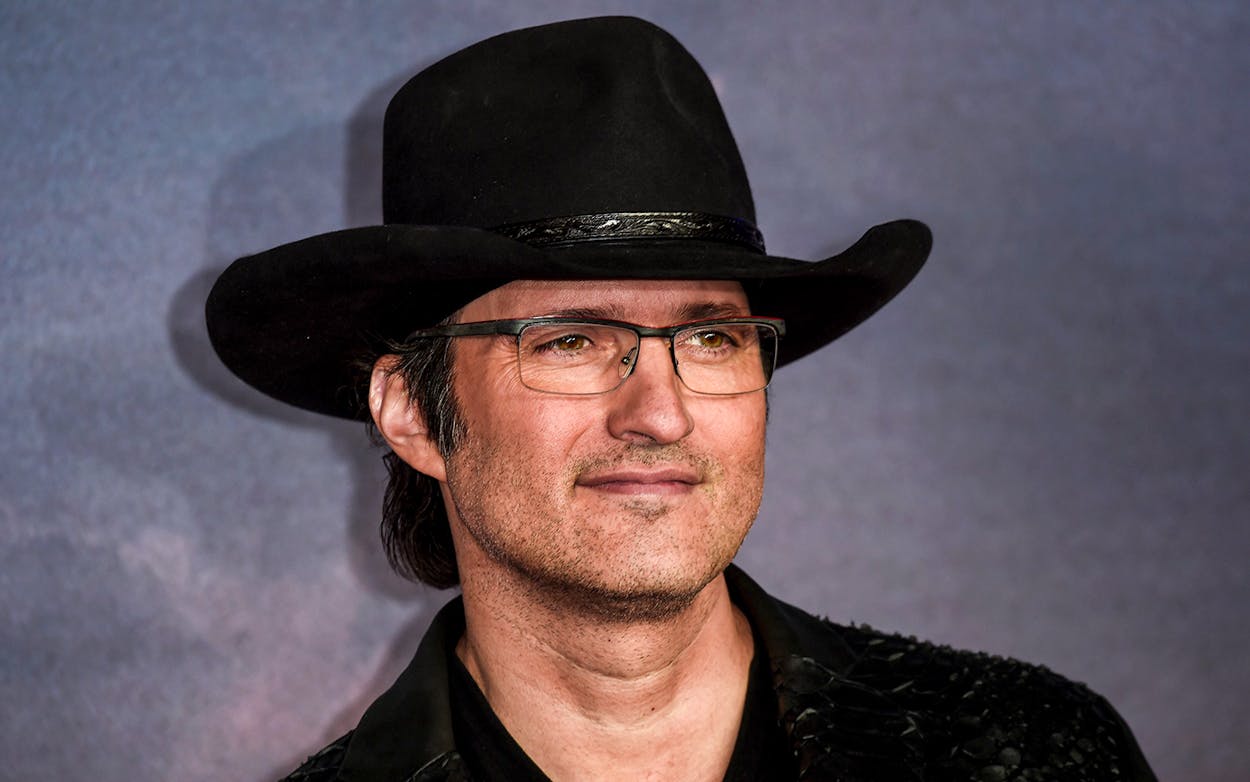Robert Rodriguez’s breakout film, 1992’s El Mariachi, famously cost him $7,000 and some change to shoot. It still holds the Guinness World Record for lowest-budget film to gross $1 million at the box office. Its success not only launched Rodriguez’s Hollywood career, but it also popularized what he called his “Mariachi-style” of filmmaking, in which he frequently takes on the roles of producer, director, writer, and sound editor. Out of necessity, he was a “Rebel Without a Crew” (the title of a 1995 book he wrote about the Mariachi experience).
Twenty-five years after El Mariachi, Rodriguez decided to put himself to the test again. Red 11—a science-fiction thriller based on Rodriguez’s experiences participating in medical research studies in Austin—was filmed on a budget of $7,000 and wrapped in 2017, overlapping with his work on the nearly $200 million Alita: Battle Angel. Its screening once more, on March 15 at the 2019 SXSW Film Festival.
Working alongside his sons Rebel and Racer, Rodriguez also documented the filmmaking process, creating six 30-minute TV episodes (to air later this year on Rodriguez’s El Rey network) that detail all that it takes to make a movie. Rodriguez spoke with Texas Monthly about the merits of low-budget productions and his docuseries, Rebel Without A Crew: The Robert Rodriguez Film School, which he hopes will inspire a new generation of filmmakers.
Texas Monthly: Tell me a little bit about the experiences you based Red 11 on.
Robert Rodriguez: I was a human lab rat [laughs]. That’s how I paid for El Mariachi, I was doing medical research studies. I tested Lipitor back in the day. It was such a funny ecosystem, and all the observations I made really lended themselves to a story. I’d written down a bunch of notes for a script, about twenty or so pages of characters and plot ideas [in 1992]. I found it recently and finally wrote the script with my son.
TM: There was a little bit of overlap between your work on Alita: Battle Angel and Red 11. What would you say are some of the advantages of a low-budget film you don’t get on a $200 million project like Alita?
RR: When you’re your own crew and you have no resources, no money, creativity has to take center stage. Magic can happen on any creative endeavor, but when you have a crew, a budget, actors, there’s all this pressure for that to happen, and it better be good. When you have nothing, that creativity is the only thing holding the movie up.
TM: In your docuseries, you talk about repurposing just two lights when you shot El Mariachi because of your tight budget. What are some of the other hacks you learned that you’ve brought to your other projects?
RR: Even just writing the script, I wrote around things I knew I had. For Red 11, I had hallways, old medical equipment. I only had a few cots when I needed ten. I only had two seat belts, and I needed ten, so I had to get resourceful. I met an actor who was working on the film who had a scar on her face, and I wrote a whole backstory for that. You find things that you already have that add to the story.
TM: Why was it important for you to share your experiences and bring people behind the scenes of Red 11 with your docuseries?
RR: It’s always just been part of my makeup. It’s been in my DNA from the very beginning. I don’t want to hold these secrets sacred because I remember what it felt like to do these things and not know if it was possible. If you can see someone else do this, suddenly, light bulbs go off. If they have something to say and no one believes in them, or if they’re underrepresented and feel like they have no voice, they can still go out tomorrow and make their film themselves.
TM: Why would you encourage filmmakers of all levels to take on a similar challenge?
RR: Anyone can find a way to make a movie, so with a [low-budget] film, it comes down to what you’re saying. It purifies the system down to the most basic element. You either have something to say, or you don’t, so it comes down to the one thing that costs nothing at all: your story.
TM: How do you think low-budget films can potentially open the doors for people who traditionally don’t have their stories heard in mainstream Hollywood?
RR: When I was starting out, I wasn’t thinking about that. I was just making movies based on my family: my brother, my sister, my uncle. Because of that, and because of the stories I wanted to tell, I had to change the system myself. I was writing and directing, so I could make the casting choices. That we needed more diverse filmmakers was clear, but you needed somebody to do what I was doing, which was get out there.
This interview has been edited and condensed for clarity.
- More About:
- Film & TV
- Robert Rodriguez








